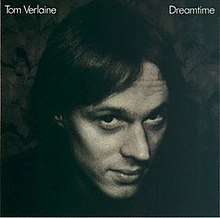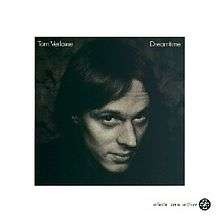Dreamtime (Tom Verlaine album)
Dreamtime is the second solo studio album by American musician Tom Verlaine, originally released in 1981. "Without a Word" is a rewrite of "Hard On Love," an unreleased Television song performed live in 1974 and 1975.
| Dreamtime | ||||
|---|---|---|---|---|
 | ||||
| Studio album by | ||||
| Released | July 1981 | |||
| Recorded | 1981 | |||
| Studio | A&R, RPM and Penny Lane Studios, New York | |||
| Genre | Post-punk | |||
| Length | 38:21 | |||
| Label | Warner Bros. | |||
| Producer | Tom Verlaine | |||
| Tom Verlaine chronology | ||||
| ||||
| Alternative cover | ||||
 1994 Infinite Zero reissue | ||||
| Review scores | |
|---|---|
| Source | Rating |
| AllMusic | |
| Christgau's Record Guide | A−[2] |
| Record Collector | |
| Rolling Stone | |
| The Rolling Stone Album Guide | |
| Spin Alternative Record Guide | 8/10[6] |
The album was reissued in 1994 by Infinite Zero Archive/American Recordings label, with two bonus tracks drawn from the 1981 "Always" 7" & 12" single. It was reissued in 2008 by Collectors' Choice Music with no bonus tracks.
Track listing
All songs written by Tom Verlaine.
Side one
- "There's a Reason" – 3:39
- "Penetration" – 4:01
- "Always" – 3:58
- "The Blue Robe" – 3:54
- "Without a Word" – 3:17
Side two
- "Mr Blur" – 3:24
- "Fragile" – 3:27
- "A Future in Noise" – 4:13
- "Down on the Farm" – 4:49
- "Mary Marie" – 3:25
Bonus tracks (1994 CD reissue)
- "The Blue Robe" (alternate version) – 4:17
- "Always" (alternate version) – 4:09
Personnel
- Tom Verlaine – guitars, solos, vocals on all tracks; bass on "Penetration"
- Ritchie Fliegler – guitars on all tracks, except "Penetration"
- Fred Smith – bass on "Mr. Blur", "Down on the Farm", "There's a Reason" and "Without a Word"
- Donnie Nossov – bass on "Always", "Mary Marie", "Fragile", "The Blue Robe", "A Future in Noise" and bonus tracks
- Jay Dee Daugherty – drums on "Mr. Blur", "Down on the Farm", "There's a Reason", "Without a Word" and "Penetration"
- Rich Teeter – drums on "Always", "Mary Marie", "Fragile", "The Blue Robe", "A Future in Noise" and bonus tracks
- Bruce Brody – keyboards on "Always", "Mary Marie", end of "Penetration" and "Always" (alternate version)
- Technical
- Robert Clifford – engineer
- David Chenkin, John Terelle, Steve Ett – assistant engineers
- George Delmerico – design
- James Hamilton – photography
Notes
- Nastos, Michael G. "Dreamtime – Tom Verlaine". AllMusic. Retrieved November 15, 2016.
- Christgau, Robert (1990). "Tom Verlaine: Dreamtime". Christgau's Record Guide: The '80s. Pantheon Books. ISBN 0-679-73015-X. Retrieved November 15, 2016.
- "Tom Verlaine: Dreamtime". Record Collector: 102.
1981's Dreamtime is a showcase for Verlaine's fretwork, the brittle, tense sound of early Television giving way to a much freer, resonant sound.
- Fricke, David (December 10, 1981). "Tom Verlaine: Dreamtime". Rolling Stone. Archived from the original on 4 June 2008. Retrieved July 21, 2017.
- Sheffield, Rob (2004). "Tom Verlaine". In Brackett, Nathan; Hoard, Christian (eds.). The New Rolling Stone Album Guide (4th ed.). Simon & Schuster. pp. 848–49. ISBN 0-7432-0169-8.
- Weisbard, Eric; Marks, Craig, eds. (1995). Spin Alternative Record Guide. Vintage Books. ISBN 0-679-75574-8.
- "allmusic (((Dreamtime > Charts & Awards > Billboard Albums)))". Retrieved 2008-09-14.
gollark: Also, as far as I know there still isn't particularly good evidence of it.
gollark: Was it?
gollark: Isn't it a weird "vaccine" which has to be used afterward?
gollark: It's actually quite readable, just entirely lacking in punctuation.
gollark: Probably some is from viruses too.
This article is issued from Wikipedia. The text is licensed under Creative Commons - Attribution - Sharealike. Additional terms may apply for the media files.